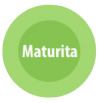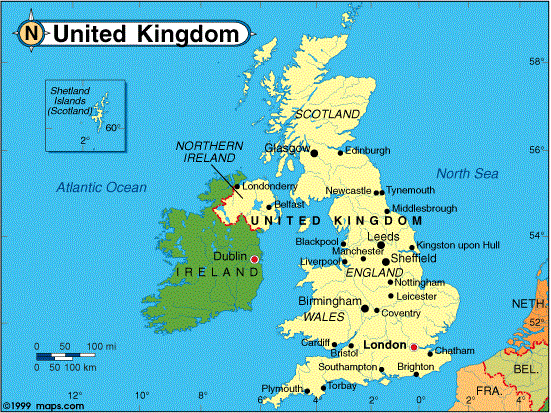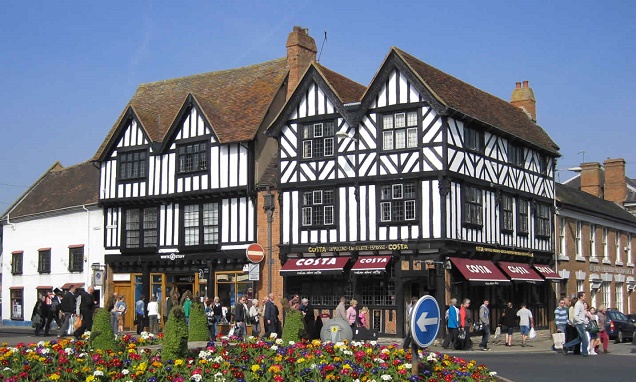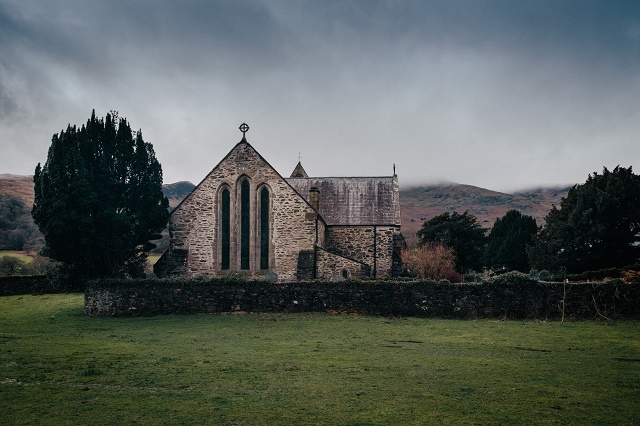

Great Britain and Ireland
The United Kingdom / spojené království
Maturita z angličtiny má i konverzační témata, na která je třeba se dobře připravit. V této lekci se zaměříme na Great Britain and Ireland a podíváme se na vzorové ukázky krátké promluvy na toto téma, užitečných frází a doplňujících otázek. Otázky vám pomůžou při tvoření bodové osnovy právě pro téma: Velká Británie a Irsko
Jak na to ?
- pokuste se říci pár slov o Velké Británii a co o ní víte vy osobně, co z vlastní zkušenosti, co ze školy
- popište krátce její geografii a známá místa, můžete se dotknout i historie
- zkuste přijít s konkrétní zkušeností, ať už vaší nebo někoho z vašich blízkých
Co radíme ?
- z následujících otázek a vzorových odpovědí si sestavte bodovou osnovu
- podle osnovy si trénujte vyprávění a snažte se přemýšlet o tom, co říkáte
- v žádném případě se nepokoušejte učit nějaké pasáže textu nazpaměť nebo vytvářet komplikovaná souvětí
- celé vyprávění musí být na takové úrovni a takové obtížnosti, abyste byli schopni jej kdykoliv zopakovat
England, Scotland and Wales (Great Britain)
together with Northern Island from the country officially known as "The United Kingdom of Great Britain and Northern Island" or simply the United Kingdom (UK).
The British Isles are formed the two major island sof Great Britain and Ireland and more than 5 000 small ones. The isles are washed off by the North Sea in the north and east, by the Irish Sea and Atlantic Ocean in the west. On the south, England and France are dividend by the La Manche Channel.
U.K. is a member of NATO (North Atlantic Treaty Organization), UNESCO and the European Union although with the latter the membership is different as compared to other members of EU (the european union). They keep driving on the left, they use their original currency and use old measuring units (pints, miles, yards, pounds, inches, feet, stones).
The British national flag is called Union Jack and it is a combination of St George's Cross (symbolizing England), St Andrew's Cross (Scotland) and St Patrick's Cross (Ireland). In 1801, as Ireland joint the UK, a red diagonal cross was added. Wales and Nothern Ireland have their own flags. The national anthem is "God Save the Queen!"
The islands off Northern Scotland include the Shetlands, the Orkneys and the Hebrides. The Isle of Anglesey off the Northwest coast of Wales, the Isle of Wight off the southern coast of England, the Isles of Arran and Bute close to the estuary of the Clyde in Scotland, Achill and the Aran Islands off the western coast of Ireland, the Isles of Scilly off the English Cornwall peninsula and many more little islands. The Channel Islands are the isles of Jersey, Guernsey and Alderney. Located in the middle of the Irish Sea, the Isle of Man is one of the most important British islands.

The climate in the UK is influenced by the Gulf Stream, so it is quite warm in England but it rains fauly often. The climate is mild and humid.
The island of Great Britain can be divided into two regions: Lowland Britain and Highland Britain. Lowland Britain covers infantile rocks of the midland, southern and easter England, while Highland Britain comprises Scotland, Wales, the Pennines – which are called the backbone of England, there are the Cumbrians in the northern part and the Lake District. The highest peak Ben Nevis (1,343m) in Grampians – and the highest mountain in Wales is Snowdon (1,085m). The longest river is the Severn and the longest lake is Loch Fyne. The most digger British lake is Lough Neagh. Other rivers of british Islands are the Thames, the Avon, the Cam, the Tyne, the Humber, the Trent.
Counties
The United Kingdom is divided into areas called counties. There are 39 of them in England, 34 in Scotland, 13 in Wales and 6 counties are to be found in Northern Ireland. Each have their own parliaments and a Governor, appointed by the Crown.
The inhabitants of the UK
The original inhabitants were the Celts and there are remnants of their language in Welsh and Scottish and Irish Gaelic. Nowadays there are the English, the Walesh, the Scots and the Irish. The official language is English but many people in Wales and Scotland are bilingual.
The British Commonwealth of Nations
The British Commonwealth of Nations is a voluntary association of Great Britain and its former colonies in Europe, Asia, Africa and America (for example Malta, India, Malaysia). It was founded in 1931 and has 49 members. The Queen of England is the formal head in 17 dominions, for example Canada, Australia and New Zealand.
Political system in Britain
Great Britain is a constitutional monarchy with the Queen Elizabeth II as the head of state. She is also the supreme commander of the armed forces and follows the advice of the Cabinet. The British Parliament is one of the oldest in the world. In Northern Ireland, the sovereign is represented by a governor.
The British Parliament and the Cabinet
The Parliament includes the sovereign, the House of Lords (which is the Upper House) with hereditary members and lifetime peers, archbishops and bishops and the Lower House is called House of Commons with 650 elected and paid members. The main role of the Upper House is to adopt laws, and Lord Chancellor is its head. General election are held every five years. Ministries are appoined by the Queen and the Cabinet is made once she has discussed this with the Prime Ministr.
British religion
The British are mostly protestant. Henry VIII established the Church of Egland. The Church of England has two provinces: Canterbury and York. The Presbyterian church of Scotland was established by John Knox. The leader of the Catholic Church in Britain is the Crdinal Archbishop of Westminster.
British economy
Britain lives by manufacture and trade. Its agriculture provides only half the food it needs and apart from coal and low-grade iron ore, some timber, hides and skins, and building materials, it has few natural resources. The other half of its food and most of the traditional raw materials for its industries have to be imported and paid for mainly by exports of manufactures, and by its net earlnings from overseas investment, shipping, tourism, and a variety of commercial and financial services.
Manchester is famous for cotton goods and corduroy cloth production. In Glasgow there are shipyards, Coventry is famous for car industry (Jaguar cars). Anoter industrial town is Liverpool. The sourthern part of England is called "green country". There are meadows, orchards and vineyards. People grow cattle and sheep there.
Wales
The capital of Wales is Cardiff and st David is the patron saint of the country. Most people are bilingual, they speak both English and Welsh. The Welsh call their country Cymru in their language.
The national instrument is the harp and the symbol is daffodil. On the flag there is s dragon. Wales is sometimes called a land of castles.
Scotland
The biggest Scottish city is Glasgow but the capital is the historical town of Edinburgh. There is Edinburgh Castle that was the home of Scotland´s royal family. Holyrood House and Royal Mile leading to the Castle are big tourist attractions.
Scots speak English and in some parts Scottish Gaelic as well. The symbol of the country is thistle. The patron saint of Scotland is St Andrew. The typical instrument is the pipe and a typical Scot is dressed in a pleated tartan kilt.
Scotland may be divided into three regions: the Highlands, the Central Lowlands and the Southern Uplands. There are the Caledonian mountains, the Grampians with the highest peak Ben Nevis, the Southern Uplands and the Cheviot Hills on the border with England. Some of the Scottish rivers are the Clyde, the Tweed and the Tay.
Ireland
Ireland is divided into the Northern Ireland, or Ulster, and the Republic of Ireland called Eire. The capital of Ulster is Belfast and the capital of Eire is Dublin.
Irish flag is a tricolour of green, symbolizing native Roman Catholics, orange, British supportem of William of Orange and white, peace between them. The symbol of the country is a green clover symbolizing the Holy Trinity and the patron saint of Ireland is St Patric.
Cities in England
Oxford is a university town. It lies on the river Thames. The first colleges opened there were Merton and Balliol. Today there are 35 colleges, each with its own character and traditions.
Cambridge lies on the river Ca mand it´s a university town as well. Those two universities are big rivals and every year they orgynize rowing competitions. There are many museums to explore such as the University Museum of Archeology and Anthropology.
Brighton lies on the southern coast of England. It is a famous seaside resort for holidaymakers from the whole of Britain. The fun centre of today´s Brighton has been the traditional and modern Victorian Palace Pier by the seaside.
Liverpool, apart from being an industrial town, became famous as the birthplace of the Beatles. These town was created so that English kings could invade Ireland. Its ships travelled the world carving salt, cotton, sugar, coal and slaves. It became one of the world´s greatest cities and ports.
In Canterbury there is the famous cathedral with the grave of the archbishop Thomas Beckett who was murdered there in 1170. He was the most famous martyr.
Salisbury Plains are famous for a place called stonehenge. These are giant stones in a circle. They are assumed to be 3 000 years old.
Bath was founded by the Romans who built a spa there. Most of the buildings in the present day city of Bath are constructed from the same material, luscious, honey-coloured stone.
Stratford-upon-Avon is the birthplace of William Shakespeare.

British history
Early British history
The country was occupied about 3 000 years ago by the Celts. The Romans built roads and forts throughout the land, for example Hadrian´s Wall against the invasion of Celtic tribes. They brought Christianity to Britain.
Governs personality
- William the Conqueror was one of the most important kings. He was Duke of Normandy, who defeated King Herold in the Battle of Hastings.
- King John in 1215 signed the Magna Carta. He developed the parliament systém.
- Henry VIII was 17 when he became king. He had six wives.
- Elizabeth I the Virgin Queen. She was daughter of Henry VIII and Anne Boleyn. She refused to get married or name her successor as marriage could have created foreign alliance difficulties. Her rightful heir was her cousin, Mary, Queen of Scots. And also the Elizabethan age is called after her.
- Viktoria was another Queen who had the whole period of reign named after her. She became Queen at the age of 18. In her lifetime, Victoria had come to symbolize the continuous and stable nature of Great Britain.
20 otázek na téma The United Kingdom
Zkuste si v rámci přípravy odpovědět na následující otázky a použijte vše, co jste se dověděli v předchozích lekcích:
- What is your favourite shop and why do you like it?
- What don’t you like about shopping?
- Do you like shopping on the Internet?
- Which is the most popular place to shop in your hometown?
- What kind of shops does it have?
- Do you like to pay with a credit card or with cash?
- If you had 1 million euros, what would you buy?
- What is something you would like to buy?
- Is it difficult for you to choose what to buy?
- Do you like to buy things for other people?
- What things do you dislike shopping for?
- What was the last thing you bought for someone else?
- Do you prefer large department stores or small boutiques?
- Do you prefer to go shopping on your own or with others?
- Who do you like to go shopping with?
- When you buy something, do you “shop around” and go to many stores to compare prices?
- When you buy something, what is most important to you: price, quality or fashion trend?
- Do you like to try on an item of clothing before you buy it?
- What is better as a present, to give money or to buy something?
- What gifts do you like to buy?
Nezapomeňte ani na slovní zásobu pro téma The United Kingdom
Procvičte si gramatické prostředky pro popis opakovaných činností a vyjádření frekvence v sekci Gramatiky

Kontrolní otázky...
-
When did the Romans start to invade and occupy Britain?
-
YES, correct
-
no, it was a bit earlier
-
no, it was a bit later
-
-
What is Henry VIII. remembered for?
-
well there were worse rulers
-
YES, he was the man of six wives
-
no, sorry the wall was built much earlier
-
-
What passes through the Old Observatory at Greenwich?
-
correct, of course
-
come on!
-
no way
-
-
For what is the Hyde Park best known?
-
it's not the oldest, sorry
-
it does not seem right, does it?
-
correct, YES
-
-
What is the name of the home of the kings and queens of Great Britain?
-
correct, this is where you can meet the Queen for garden party :-)
-
it's more home for dead people
-
oh, what would the Prime Minister say?
-





